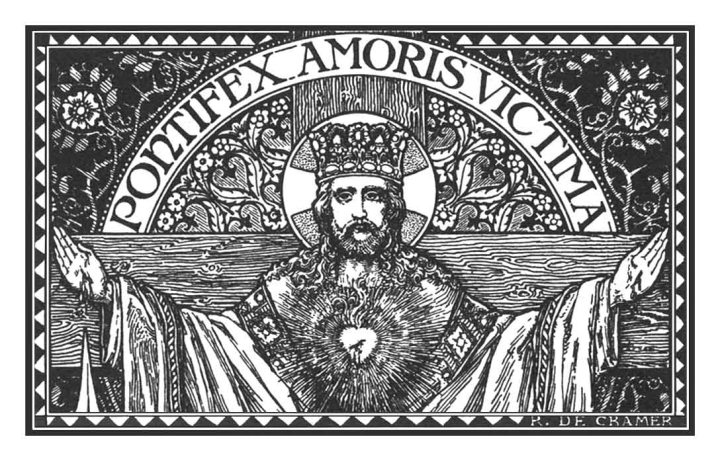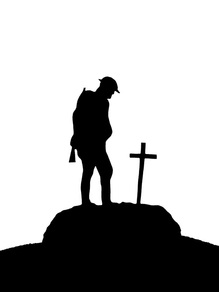The Feast of Christ the King is a fairly recent addition to the liturgical calendar. It was instituted by Pope Pius XI in 1925, but the ideas which lie behind it are much older. To stress the idea that Christ is the King of Heaven and Earth is to acknowledge the fact that there is an authority which is higher than any human authority. Christ, as king, unites humanity and points to the Peace of the Kingdom of God rather than the divisions of class and nationalism which lie at the root of the traumatic events of the last one hundred years.
‘For Jesus Christ reigns over the minds of individuals by His teachings, in their hearts by His love, in each one’s life by the living according to His law and the imitating of His example.’
Pope Pius XI Ubi Arcana Dei Consilio 48 (23.xi.1923) [http://w2.vatican.va/content/pius-xi/en/encyclicals/documents/hf_p-xi_enc_19221223_ubi-arcano-dei-consilio.html]
This is a great claim to make, and a necessary one for Christians: to acknowledge Christ before all things, even before our family and friends. More than being Welsh, or British, or anything else, we belong to Christ, and acknowledge Him as our Lord and God. Our faith affects who we are and what we do. Nowhere is this more clear than in understanding where our primary allegiance lies. To say that, ‘Jesus is Lord’ is at one level to say that, ‘Caesar is not’. When faced with a religious cult where the Roman Emperor was worshipped as divine, our forebears made a choice. While they would pray for the Emperor as a temporal ruler they would not honour him as a god. They bore witness to their faith at the cost of their lives, because some things are more important, namely our relationship with the God who loves us and saves us.
In our readings this morning we hear in the prophecy of Daniel, that God will come to be our judge, and that the Son of Man — who is Jesus — is given dominion, glory, and a kingdom. All peoples, nations, and languages should serve Him, His dominion is everlasting and will not pass away. Christ the Word made Flesh is the fulfilment of Scripture, in Him, prophecy is fulfilled, and made real.
We see Christ’s kingship most strikingly in the interaction between Jesus and Pontius Pilate in this morning’s Gospel. Picture the scene: Jesus has been arrested and is being questioned. His disciples have deserted him, and He stands alone in the governor’s palace. Pilate says to Him, ‘You are the King of the Jews?’ Pilate doesn’t understand, it doesn’t make sense. The Jews have handed Jesus over to be crucified under Roman Law, rather than the usual punishment of being stoned as a blasphemer. To claim to be a king is to stand in opposition to the authority of the Emperor, but how does this man do this? He doesn’t look like a king, or act like one.
Pilate explains that Jesus has been handed over by the Jews and their chief priests, and asks Him, ‘What have you done?’(18:35) Jesus does not answer, instead He states, ‘My kingship is not of this world; if my kingship were of this world, my servants would fight, that I might not be handed over to the Jews; but my kingship is not from the world.’ (Jn 18:36) Jesus’ kingship is not of this world. Then from where is it? The answer is surely the heavenly realm. Christ is a Divine King, and whereas the emperor may claim to be DIVI FILIVS, son of a god, Jesus Christ is King because He is the Son of God.
Jesus goes on to say, ‘For this I was born, and for this I have come into the world, to bear witness to the truth. Every one who is of the truth hears my voice.’ (Jn 18:37) This is what Christ was born to do, to bear witness to the truth. He is ‘the Way, the Truth, and the Life’ (Jn 14:6). In His Passion, Christ bears witness to the truth, namely that, ‘God so loved the world that he gave his only Son, that whoever believes in him should not perish but have eternal life. For God sent the Son into the world, not to condemn the world, but that the world might be saved through him.’ (Jn 3:16-17) This is what real kingship looks like, selfless love and sacrifice. It is not about acquiring and displaying wealth, power, or privilege. To add insult to injury, after Jesus has been flogged, the Roman soldiers put a purple robe on Him and place a crown of thorns on His head, to mock him (Jn 19:2-3) with the trappings of a king. Their mockery is self-defeating, as it proclaims Christ’s kingship. The true King of the Jews is the Suffering Servant, bruised for our iniquities. Christ displays His royal power when he reigns, not on a throne, but from the Cross. God’s kingdom is about healing, forgiveness of sins, and the restoration of humanity, to give us the hope of Heaven.
Christ, risen, ascended, and glorified, will come to be our judge. Images of the Risen Christ still bear the marks of nails in His Hands and Feet, and the mark of the spear in His Side, because they are the wounds of LOVE. This is the love God has for each and every one of us. We may not deserve it, we cannot earn it, but God gives it to us, who believe in His Son, Our Saviour Jesus Christ. We are challenged to live lives which proclaim that love to the whole world.
Before they were martyred in Mexico and Spain, by regimes opposed to our faith, Christians would cry ‘¡Viva Christo Rey!’ ‘Long live Christ the King!’ just before they faced a firing squad or the hangman’s noose. To acknowledge Christ’s kingship is to do something radical. It is to say to those with worldly power, ‘We acknowledge something greater and more powerful than you!’ It is a radical political act, which terrifies those who are insecure. As Christians we are different. We have built the house of our faith on the rock which is Christ, and not the shifting sands of this world.
The world around us may look dangerous and uncertain. Whatever we face, we can be assured of the simple fact that God loves us, and that we are part of a kingdom of love. Let us live this out in our lives, so that others may come to believe and give glory to God the Father, God the Son, and God the Holy Ghost, to whom be ascribed as is most right and just, all might, majesty, glory dominion, and power, now and forever. Amen.


